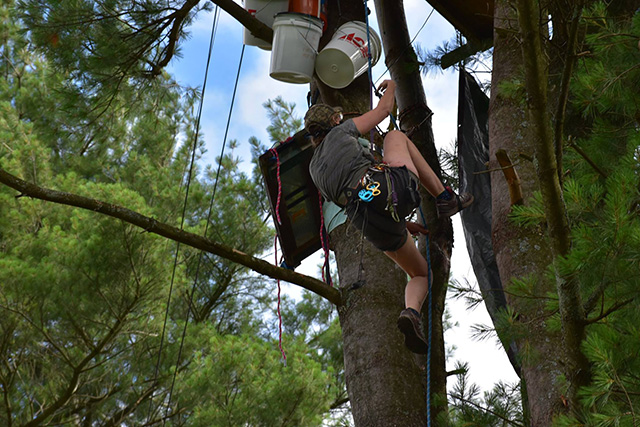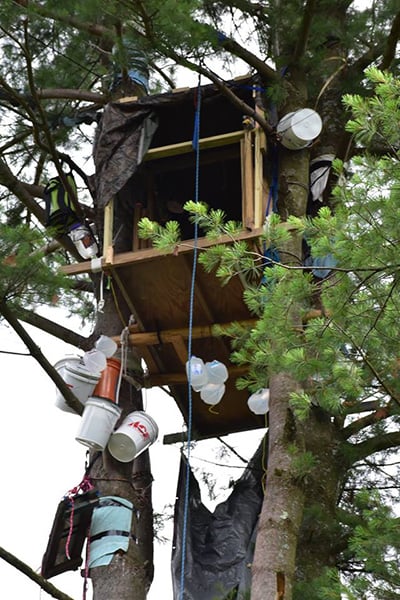
Camp White Pine (CWP) — a resistance camp formed by people fighting the Mariner East 2 pipeline — sits on 27 acres of privately owned land in rural Huntingdon County, Pennsylvania, population 45,634. The land defenders at CWP have come together to fight this pipeline as well as the fracking crisis in Pennsylvania and the mineral extraction industry as a whole.
If completed, the Mariner East 2 (ME2) will add two pipelines to the existing Mariner East 1 to transport highly explosive natural gas liquids. The proposed route crosses through 350 miles of Ohio, West Virginia and southern Pennsylvania, ending at the Marcus Hook refinery on the Delaware River. Despite the industry’s claims that ME2 is necessary for US energy needs, the natural gas liquids that make their way through the pipeline will actually be transported to Scotland, where British-owned corporation INEOS will use them to make plastic products.
The Mariner East 2 was a project of Sunoco Logistics, which completed a merger on April 28, 2017, with the notorious Energy Transfer Partners (ETP), the company behind the Dakota Access pipeline. ETP has one of the worst safety records of companies in the industry, and has unleashed brutal violence and human rights violations at Standing Rock and against those resisting other current pipeline projects, such as the Bayou Bridge Pipeline in Louisiana.
Although it is not yet completed, the ME2 is already responsible for 202,000 gallons of drilling fluids spilled in 90 events at 42 sites in Pennsylvania, leading to the contamination of well water for many area residents. In the aftermath of these spills, the Pennsylvania Department of Environmental Quality imposed bans on Horizontal Directional Drilling (HDD) and established other safety restrictions for the pipeline, which ETP soon violated. The Pennsylvania Department of Environmental Protection released a statement on November 15, 2017, regarding a new HDD spill in Berks County. ETP didn’t have the necessary permits to drill, either.
ETP recently announced a completion date for the ME2 of the second quarter of 2018, approximately 18 months later than the original date. This delay is due in part to the successful resistance efforts of Pennsylvania residents, including the people at Camp White Pine.
Targeted by Police for Sitting in Trees
 An activist at Camp White Pine climbs into a tree-sit. (Photo: Courtesy of Jen Deerinwater)
An activist at Camp White Pine climbs into a tree-sit. (Photo: Courtesy of Jen Deerinwater)
CWP resides on the land of Ellen and Steven Gerhart, a retired school teacher and artist. Since first learning of the ME2 in March 2015, Ellen and her daughter Elise Gerhart have taken numerous steps — including direct action, as well as an ongoing class-action lawsuit and private civil suit — to protect their home from the devastating effects of resource extraction.
CWP’s creation in February 2017 was influenced by the camps at Standing Rock. The camp consists of three “tree sits” — platforms and small homes that provide safe shelter to the land defenders. The “sits” were built into the trees in February 2016, and strategically placed in order to prevent hundreds of trees on the three-acre pipeline easement from being felled in order to construct the HDD. If constructed, the HDD would cross a small pond on the Gerharts’ land that is fed by a stream that discharges into the Little Trough Creek, a tributary of the Juniata River. The Huntingdon County area consists of wetlands, family homes and small farms of livestock and crops.
The Gerharts’ home was invaded by tree-cutting crews and police three times in 2016, before ETP even obtained its permits to build. On March 29, 2016, tree-cutting crews and police entered, without notice, the back of the Gerhart’s land and proceeded to the ill-marked pipeline easement. Elise Gerhart and her friends occupied three tree sits at the time and prevented those trees from being cut down.
While in the sit, Gerhart said the Sunoco tree-cutting workers took pictures and videos of her with their phones and joked about hurting or killing her, and law enforcement officers also mocked her. Gerhart said the trees were falling all around her, including into the safety lines that protected her from falling out of the tree sit, 50 feet in the air.
Gerhart and the land defenders on the ground told Truthout that the police merely stood by and watched the danger unfold. “It was just really traumatizing, the whole thing, and they meant it to be,” Gerhart told Truthout.
Police made two arrests that day on the Gerharts’ property: Pennsylvania residents Alex Lotorto and Elizabeth Glunt, who were present to observe for any safety or legal violations, were taken into custody. Both were charged with disorderly conduct and criminal contempt.
Lotorto said he was off the pipeline easement at all times, speaking cordially with law enforcement officers, and was in communication via walkie-talkie with others in order to maintain the safety of those on the ground. After speaking for some time with police about their Easter holidays, Lotorto said the police returned with paperwork and asked “Are you Alex Lotorto?” They then arrested him and held him on $200,000 bail.
Glunt’s arrest came after she crossed onto the easement to tell the cutting crews they were getting too close to the tree sits. She saw that law enforcement officers were taking no action to protect those in the sits, and was concerned about their safety. She was arrested and held on $100,000 bail. When asked how she was treated by police, Glunt told Truthout, “They treat you like you’re a piece of shit and like you’re a terrible person even though you’re literally standing there, not doing anything wrong.”
On March 30, 2016, the cutting crews and law enforcement returned a second time. Two people were arrested: Nate Irvin and Ellen Gerhart. Ellen Gerhart said she told the sheriff’s deputies, “You have to do something because they’re getting too close to the tree that Elise is in.” Their response was to arrest her for “creating a hazardous situation.” She was later released on her own recognizance.
The tree-cutting crews and law enforcement returned to the Gerharts’ home on April 7, 2016. This action was not permitted by law: Thanks to the US Fish and Wildlife Service’s protections of migratory birds and the Indiana bat, all logging and tree-cutting companies were prohibited from entering certain portions of protected land (including the Gerharts’ land) after March 31 and before November 14, 2016. Despite knowing this law, the tree-cutting crews and law enforcement returned to the Gerhart’s home.
These protections ended on November 15, 2017. Elise Gerhart reported during a conference call that there was a significant increase in aerial surveillance, which now includes both a helicopter and an unidentified plane, beginning November 14, 2017. She said she heard chainsaws from her bedroom and rushed to the sits again.
Arrests and charges were again made. Ellen Gerhart was arrested and held in jail for three days for telling the police the cutting crews were getting too close to the sit her daughter occupied. She was also placed in isolation on “suicide watch” even though she was not suicidal, says Gerhart. She was denied access to a phone call, legal counsel and medical care for part of her time in jail. While being interrogated by a corrections officer at the Centre County Correctional Facility, Gerhart said she refused to answer questions and asked for legal counsel again. She was then told by the officer that refusing to answer questions was a “level one offense.” She wasn’t given access to her attorney until three days after her arrest.
Also on April 7, Elise Gerhart was charged with disorderly conduct, but not arrested, while the other tree-sitters were not charged. The Gerharts’ civil suit court documents claim that the defendants targeted Elise “not in the pursuit of justice, but to arbitrarily and maliciously send a message to the Gerhart family and their supporters to discourage their opposition to the pipeline.” The charges against Elise were eventually dropped.
It wasn’t until February 13, 2017, that ETP even obtained permits to begin construction on the ME2. However, before that, ETP had already been obtaining Orders of Protection and Writs of Possession, which essentially treated the Gerharts as renters on their own land and ETP as their landlord. A Writ of Possession is usually given to landlords in order to evict tenants and use law enforcement in the process. The fact that this was granted to ETP shows how both the company and the state view the land and those living on it.
The Gerharts are currently involved in a class-action suit led by the Clean Air Council to have the permits pulled from ETP. They also have a case against the use of eminent domain to obtain their land for the ME2. This case may be heard by the Pennsylvania Commonwealth Supreme Court. Additionally, on September 25, 2017, Ellen and Elise Gerhart, Alex Lotorto and Elizabeth Glunt filed a civil suit against ETP, Sunoco Logistics, TigerSwan, social media professional Nick Johnson (who was hired by TigerSwan), and Huntingdon County Sheriffs and Pennsylvania State Troopers for wrongful arrest and harassment. CWP and Elise Gerhart are also members of the Stop ETP coalition, which was formed with the sole objective of stopping the pipeline company’s projects.
 One of three tree sits at Camp White Pine. (Photo: Courtesy of Jen Deerinwater)
One of three tree sits at Camp White Pine. (Photo: Courtesy of Jen Deerinwater)
Threats, Intimidation and Ongoing Struggle
Since the beginning, CWP, the Gerharts and the land defenders at the camp have been targets of harassment, surveillance, infiltration and threats of murder and rape. Elise Gerhart, as well as several of the land defenders, have been followed on numerous occasions and had photos of themselves, their cars and personal information placed on the Facebook group PA Progress, created by Nick Johnson, a social media professional hired by ETP-employed mercenary firm TigerSwan. (The group no longer exists.)
A person known only as “Wendy” to those at the camp came to the Gerharts’ home on multiple occasions without invitation or notice, saying she had worked with organizers in the past, although no one knew her. Elise Gerhart said that her story “never checked out so we didn’t let her in the camp.” It was shortly after her visits that photos of people’s cars that were not visible from the road were posted on PA Progress.
Additionally, numerous surveillance helicopters and drones have flown over the Gerharts’ property and the camp. In one incident, a helicopter flew so low that it shook the tree someone was sitting in. Despite numerous complaints — which have included photographs and helicopter tail numbers — the Federal Aviation Administration (FAA) has not acknowledged any wrongdoing regarding the flyovers. An email to Elise Gerhart from Michael A. McEvers, principal operations inspector at the FAA, claimed that “the aircraft in question has an authorization that permits him to conduct flight operations at the altitudes and areas in question.” The FAA provided no further response.
This surveillance could bring more legal action against the land defenders. The Intercept reported that TigerSwan is employing “follow-the-money tactics” regarding anti-pipeline groups that could lead to a similar RICO case as the one in North Dakota against those fighting the Dakota Access pipeline.
Despite the dangers that come with land defense, many of the climbers and those on the ground supporting them have said they won’t be deterred from this mission. Cass Struggle, a resident of South Philadelphia, said she came to this work partially due to the air pollution from which people in her area are suffering. She said Camp White Pine is a “very strategic chokepoint.”
She described her time in the trees as “meditative” and as a “learning opportunity” for climbing and the land-defense tactics tree-sits provide. When asked if she ever felt unsafe in the trees, she said it’s only due to “external factors” of police and pipeline workers.
Struggle said that when she goes into the trees, she does so with the assumption that she could be up there for a while due to the possibility of police and tree crews coming in unannounced. For her tree-sit shifts, she goes up with food, water, medication and any other items she might need for an extended amount of time.
Many of the land defenders at CWP have said they’re not there to fight for the Gerhart’s private property, but rather against corporate interests and the decolonization of the US. Dan Solomon of Brookline, Massachusetts, has recently begun to engage as an accomplice in the fight for Indigenous sovereignty and the environmental issues impacting it. “I’m a settler here, and understanding what that means and the responsibility of working to stop that really fucked-up system.” Solomon said he believes that “it’s all wrapped up in capitalism and colonization.”
The use of eminent domain for extraction projects is business as usual for the US government. The land being stolen from white people for extraction purposes is the same land stolen from my ancestors in order to grow capitalist and colonialist consumption of the Earth. What we’re seeing with these land grabs by ETP are the American chickens coming home to roost. Both Ellen and Elise Gerhart recognize their place in settler colonialism. “Our resistance here is really hypocritical in a lot of ways … this fight for property rights is happening on stolen land,” Elise said.
When queried about CWP’s intentions and the accusations of ecoterrorism and violence made by ETP and TigerSwan, Elise Gerhart said the camp is “peaceful.” She sees her fight against the ME2 as both a micro- and macro-vision. “[Natural gas liquids] are used for plastics manufacturing … that obviously contributes to a huge amount of global pollution in the oceans and Southeast Asian nations who get all this plastic washed up on their shores.” Ellen Gerhart responded that in the “broadest scenario, I would like to see us get out of the fossil fuel industry … it seems so short-sighted to say, ‘Oh well we can make some money off of this and we can do all this in the short term.'”
Construction on the pipeline has significantly increased. The ME2 is now approximately coming from both the east and west of Camp White Pine, 100 yards from the property line, according to Elise Gerhart.
Currently, those at CWP are bracing for an invasion by workers and police that they believe will come any day now. Struggle said, “the feeling was that a raid was going to be imminent. That’s kind of always the feeling here.”
Join us in defending the truth before it’s too late
The future of independent journalism is uncertain, and the consequences of losing it are too grave to ignore. To ensure Truthout remains safe, strong, and free, we need to raise $22,000 by the end of today. Every dollar raised goes directly toward the costs of producing news you can trust.
Please give what you can — because by supporting us with a tax-deductible donation, you’re not just preserving a source of news, you’re helping to safeguard what’s left of our democracy.